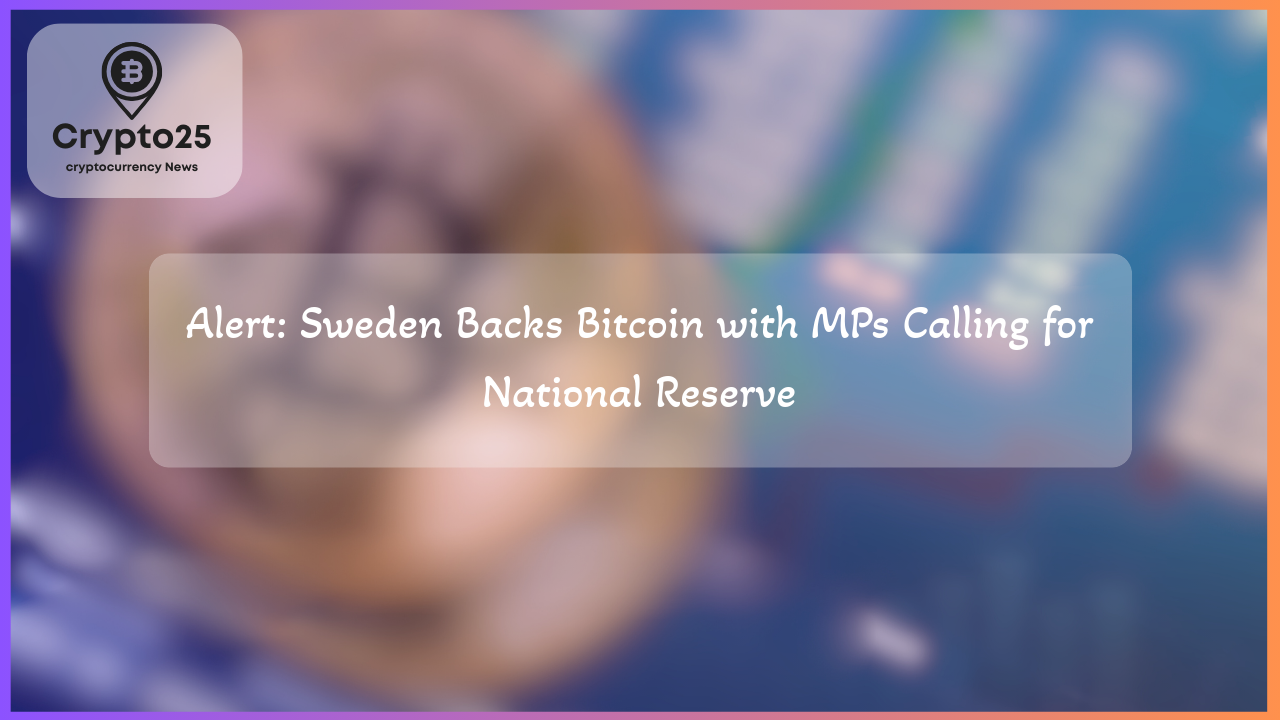
Sweden Explores Bitcoin as a Strategic Financial Asset
Swedish lawmakers have proposed a bold push to integrate Bitcoin into the nation’s financial strategy. Highlighting Bitcoin’s potential as a digital equivalent of gold, the proposal urges Sweden’s government to consider holding Bitcoin in its foreign exchange reserves. This development reflects a growing global trend of adopting cryptocurrencies amid economic and geopolitical uncertainty, even as Sweden remains cautious about fully embracing the crypto ecosystem.
### Should Sweden Add Bitcoin to Foreign Exchange Reserves?
Swedish Members of Parliament Dennis Dioukarev and Rickard Nordin argue that Bitcoin’s resilience as a store of value during turbulent economic times makes it a prime candidate for foreign exchange reserves. In a letter dated April 14 to Finance Minister Elisabeth Svantesson, they stressed Bitcoin’s unique monetary properties. According to them, Bitcoin operates much like gold—serving as a hedge against inflation and a safeguard against fiat currency volatility, particularly under authoritarian rule.
Nordin suggested taking inspiration from the United States, which reportedly retains Bitcoin seized in federal cases rather than auctioning the asset. This budget-neutral strategy could enable Sweden to build a significant reserve without involving taxpayers. Moreover, strengthening Sweden’s forex portfolio with Bitcoin would align the country with a growing global sentiment toward crypto-backed financial sovereignty.
The proposal is not entirely without precedent. In countries like El Salvador and Singapore, Bitcoin already plays a role in government economic frameworks. Yet Sweden faces significant domestic resistance, fueled by skepticism about the cryptocurrency sector’s compliance and taxation issues.
### Sweden’s Regulatory Concerns Slow Bitcoin Adoption
Despite a political push toward Bitcoin adoption, Sweden’s regulators remain wary of the broader cryptocurrency industry. Recent investigations by the Swedish Tax Agency and the Financial Intelligence Unit uncovered widespread tax evasion and possible illicit activities within the sector. Reports disclosed that of 21 Bitcoin mining operations inspected between 2020 and 2023, 18 had committed tax irregularities, resulting in approximately $90 million in unpaid taxes.
Moreover, Swedish authorities have labeled certain crypto exchanges as hubs for money laundering and financial crimes. This scrutiny, coupled with obligations to adhere to FATF (Financial Action Task Force) compliance standards, has painted a cautious picture of crypto adoption. Such challenges have slowed Sweden’s ability to craft a comprehensive policy regarding Bitcoin as part of its treasury holdings.
Nevertheless, support for Bitcoin from fintech leaders like Klarna—Sweden’s premier digital payment provider—is reshaping public opinion. Klarna’s February decision to integrate cryptocurrency features into its platform may signal growing acceptance of digital currencies in mainstream financial ecosystems. If embraced correctly, Bitcoin could pave the way for Sweden to modernize its financial strategy.
### The Global Race to Adopt Bitcoin
While Sweden evaluates its options, the international stage continues to see nations moving toward crypto adoption in varying forms. For instance, the U.S. government has begun quietly building its Bitcoin reserves through similar budget-neutral strategies. Meanwhile, institutions like the International Monetary Fund (IMF) and the European Union are investigating how decentralized currencies could coexist with traditional systems.
This momentum lends additional weight to Swedish MPs’ proposal to integrate Bitcoin into its reserves. In their appeal, they emphasized Bitcoin’s role as a tool for financial inclusion in politically volatile and economically unstable regions. This argument may particularly resonate in Scandinavia, where financial policies frequently focus on global economic inequities.
Sweden stands at a crossroads: on one side, skepticism driven by regulatory challenges remains a major stumbling block, while on the other, Bitcoin’s appeal as a transformative financial tool continues to grow. With mounting pressure to follow international trends, policymakers must decide whether the potential long-term benefits outweigh the industry’s current challenges.
### Sweden’s Bitcoin Strategy Moving Forward
The debate surrounding Bitcoin’s inclusion in Sweden’s financial reserves marks a pivotal moment in the country’s monetary policy discourse. While skepticism about the broader crypto industry persists, the strategic advantages of Bitcoin cannot be ignored. Its ability to reduce reliance on traditional fiat assets while offering a hedge against inflation aligns with both modern financial trends and Sweden’s commitment to innovation.
Whether Finance Minister Elisabeth Svantesson takes concrete action on the lawmakers’ recommendations remains uncertain. Yet, as global momentum for cryptocurrency adoption continues to build, Sweden must soon determine its stance on joining the Bitcoin revolution or risk being left behind in the evolving financial landscape.
| Title | Details |
|---|---|
| Bitcoin as Reserve | Proposed addition to Sweden’s forex reserves |
| Market Cap | $1.2 Trillion (Global Crypto Market) |
As the discussion unfolds, one thing remains clear: Bitcoin is no longer just an experimental asset. It’s increasingly becoming a critical part of global financial dialogues. Sweden’s policymakers must now weigh Bitcoin’s potential as a strategic asset against the challenges posed by its volatile and fragmented industry.
